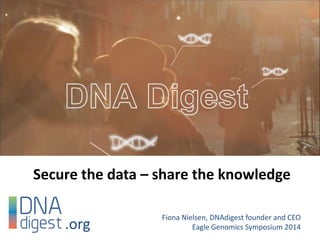DNAdigest Eagle Genomics Symposium March 27, 2014
- 1. Secure the data ©C share the knowledge Fiona Nielsen, DNAdigest founder and CEO Eagle Genomics Symposium 2014.org
- 3. !
- 8. Why is no more data available to provide evidence-based results?
- 9. Data Privacy vs Data Access Restricted access repositories Open access ? Time-consuming deposit ? Time-consuming access ? Difficult to discover data ? Requires consent for open access (PGP) or ? Details removed (1k genomes)
- 10. deadlock
- 11. ? Data discovery ? Data access ? Incentives You are invited!
- 12. ? Connectivity ? Aggregation ? Immediate access
- 13. DEMO
- 16. Secure the data ©C share the knowledge @DNAdigest Support our work at http://tiny.cc/funddna .org
Editor's Notes
- #3: The data tsunami. ThatĪ»s us!
- #4: Latest prediction for 2015 based on the capacity of the planned delivery of HiSeqX systems for human genomes. DonĪ»t panic!
- #5: Promises of genomic medicine
- #6: Rosy picture breaks when you cannot make sense of the data
- #7: There is no limit to the number of data analysis programs available, but there is a serious bottleneck in access to data for comparison, filtering and testing of hypotheses
- #8: Clinical pilot studies: max 25% WES and WGS enable diagnosisLittle overlap between interpretation, conclusion of different labs looking at the same dataClearly we are in an unwanted situation. Why is no more data available to provide evidence-based results?
- #10: Trade-off: details are necessary for data re-use!Advantage: access to complete datasets of genetics and medical dataDisadvantage: cumbersome, timeconsuming and slow processing of application for accessDisadvantage: difficult to discover the data you need
- #11: Not easy to discover dataNot easy to apply for access to dataNot easy to deal with bulk datasetsAs a consequence:Researchers do not cross-check their resultsData is not re-used for analysisResearchers duplicate existing workResults are published based on small sample sizeswhere
- #12: Collaborative approach
- #13: Collaborative approach
- #15: Allow more knowledge to be generated from data
- #16: Create new hope for genetic research
















